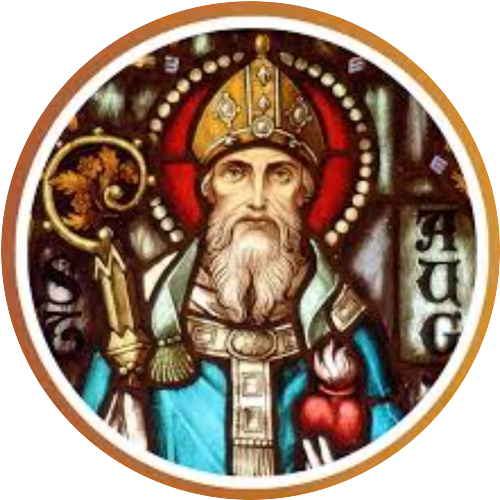T29-2 賓客の来臨
O Holy Spirit, descend plentifully into my heart.
ああ、聖霊よ、どうか私のもとに舞い降りて私の心の奥底まで入ってきてください。
Enlighten the dark corners of this neglected dwelling and scatter there Thy cheerful beams.
この打ち捨てられていた住処の暗くなった隅々を照らして、私の心にあなたの鋭気に満ちた輝きを振りまいてください。

St. Augustine
聖アウグスティヌス

今回はテキスト第二十九章から「賓客の来臨」という一節をご紹介します。
賓客ってだれのこと?
「賓客」は聖霊のことを指しています。
聖霊が私たちの許に訪れたという表現がなされてはいますが、聖霊は元から私たちの心の中の分離していない部分にいるので、正確には、私たちの認識の変化(正しい知覚への進化)によって、分離幻想という障害が取り除かれて、そこにいた聖霊の存在に気づけるようになったことで、私たちの自覚の中に聖霊が到来したということです。

外にいる聖霊が新たに訪れるのではない
5.「Yet He Who entered in but waits for you to come where you invited Him to be.
しかし、あなたが聖霊にいてほしいと招いた場所に入りこんだ聖霊は、そこにあなたが来ることだけを待っています。
There is no other place where He can find His host, nor where His host can meet with Him.
聖霊が自らを宿す者を見出せる場所も、聖霊を宿す者が聖霊に出会える場所も、ここ以外にはどこにもありません。
And nowhere else His gifts of peace and joy, and all the happiness His Presence brings, can be obtained.
そして、ここ以外の場所では、平安と喜びという聖霊からの贈り物や聖霊の臨在がもたらす幸せのすべてを得ることはできません。」
ですから、もともとそこにいた聖霊が私たちの自覚に到来することは、私たちが聖霊の居場所に赴くことです。
決定者(decision-maker)としての私たちは、心の中のエゴの領域と聖霊の領域を行き来する状態から、聖霊の居場所とのみ同定しなければなりません。
私たちが自分と兄弟との間にあると思っている隙間が私たちが聖霊の居場所に赴くのを妨げる障壁です。
ですが、この隙間は実際には存在しない幻であり、錯覚で、実体は無です。
ですから、隙間が無であることを認める必要があります。
そのためには、エゴの盟友である身体が無であることを正しく知覚することが重要です。

テキスト第二十九章
II. The Coming of the Guest
二 賓客の来臨
1. Why would you not perceive it as release from suffering to learn that you are free?
どうしてあなたは、自分が自由だと学ぶことが苦しみからの解放になると理解しようとしないのでしょうか。
Why would you not acclaim the truth instead of looking on it as an enemy?
どうしてあなたは、真理を敵とみなすのではなく、真理を歓呼して迎え入れようとしないのでしょうか。
Why does an easy path, so clearly marked it is impossible to lose the way, seem thorny, rough and far too difficult for you to follow?
こんなにもはっきりとした道標がある絶対に迷いようのない平坦な道が、どうしてあなたが辿るには、あまりにも困難すぎる長くてやっかいな起伏に富んだ荊の道に見えてしまうのでしょうか。
Is it not because you see it as the road to hell instead of looking on it as a simple way, without a sacrifice or any loss, to find yourself in Heaven and in God?
それはあなたが、その道を、自分が天国と神の中にいると気づくための犠牲や損失を伴わないなだらかな道だとは考えずに、地獄に至る道だとみなしているせいではないでしょうか。
Until you realize you give up nothing, until you understand there is no loss, you will have some regrets about the way that you have chosen.
自分は何ひとつ手放すことにはならないとあなたが悟るまで、つまり、いかなる喪失もありえないとあなたが理解するまでは、あなたは自分が選んだ道について多少なりとも後悔の念を抱くでしょう。
And you will not see the many gains your choice has offered you.
それまでの間は、あなたは自分の選択によってたくさんの利益が自分にもたらされていることがわからないままでしょう。
Yet though you do not see them, they are there.
しかし、たとえあなたに見えていないとしても、あなたの選択がもたらした恩恵はちゃんとそこにあるのです。
Their cause has been effected, and they must be present where their cause has entered in.
それらの原因は結果をもたらしたので、それらの結果はその原因が入ってきたところに存在するに違いないからです。

2. You have accepted healing's cause, and so it must be you are healed.
あなたはすでに癒しの原因を受け入れています。だから、あなたは癒されているに違いありません。
And being healed, the power to heal must also now be yours.
そして、癒されているのだから、いまや癒す力もまた、あなたのものになっているに違いありません。
The miracle is not a separate thing that happens suddenly, as an effect without a cause.
奇跡は、原因を持たない結果として突然起こる孤立した出来事ではありません。
Nor is it, in itself, a cause.
それに、奇跡は奇跡それ自体を原因として起こるものでもありません。
But where its cause is must it be.
それでも、奇跡の原因があるところには、奇跡は必ず存在します。
Now is it caused, though not as yet perceived.
まだ知覚されていないとしても、今、原因が奇跡を起こしたからです。
And its effects are there, though not yet seen.
だから、たとえまだ見えていないとしても、奇跡という結果はそこにあるのです。
Look inward now, and you will not behold a reason for regret, but cause indeed for glad rejoicing and for hope of peace.
今こそ自分の内面を見てください。そうすれば、あなたはそこに落胆する理由ではなく、平安への希望を抱いて欣喜雀躍する原因を見るでしょう。
3. It has been hopeless to attempt to find the hope of peace upon a battleground.
戦場で平安の希望を見出そうとするのは絶望的なことでした。
It has been futile to demand escape from sin and pain of what was made to serve the function of retaining sin and pain.
罪と苦痛を維持する役目を果たすために作られたものによって罪と苦痛から逃れようとしても無駄でした。
For pain and sin are one illusion, as are hate and fear, attack and guilt but one.
というのは、憎しみと恐れ、攻撃と罪悪感がひとつの幻想でしかないのと同じように、罪と苦痛もひとつの幻想だからです。
Where they are causeless their effects are gone, and love must come wherever they are not.
罪と苦痛という幻想に原因が欠如しているところでは、罪と苦痛という結果も消え去っているので、それがどこであれ、結果が去ってなくなったところには、必ず愛が訪れます。
Why are you not rejoicing?
あなたは喜ばずにはいられないはずです。
You are free of pain and sickness, misery and loss, and all effects of hatred and attack.
あなたは苦痛や病気、悲惨さや喪失、そして憎悪や攻撃がもたらすあらゆる結果から解放されているのですから。
No more is pain your friend and guilt your god, and you should welcome the effects of love.
もはや苦痛はあなたの友ではないし、罪悪感はあなたの神ではないのだから、あなたは愛の結果を歓迎すべきです。

4. Your Guest has come.
あなたの賓客はすでに到来しています。
You asked Him, and He came.
あなたが聖霊に求めたがゆえに、聖霊は来てくれたのです。
You did not hear Him enter, for you did not wholly welcome Him.
あなたには聖霊が入ってくるのが聞こえませんでした。それは、あなたが聖霊を完全に歓迎してはいなかったからです。
And yet His gifts came with Him.
それでも、聖霊は贈り物を携えて訪れてくれたのです。
He has laid them at your feet, and asks you now that you will look on them and take them for your own.
聖霊はその贈り物をあなたの足許に置いて、今、あなたにその贈り物を見て、それをあなたのものとして受け取るように求めています。
He needs your help in giving them to all who walk apart, believing they are separate and alone.
聖霊は、それらの贈り物を、自分たちはばらばらに分離した孤独な存在だと信じこんで、離ればなれになって歩んでいるすべての者たちに与えるために、あなたの助けを必要としています。
They will be healed when you accept your gifts, because your Guest will welcome everyone whose feet have touched the holy ground whereon you stand, and where His gifts for them are laid.
あなたが自分の贈り物を受け入れるとき、彼らは癒されるでしょう。なぜなら、あなたが立っている場所であり、聖霊から彼らへの贈り物が置かれている場所である聖なる地に足を踏み入れたすべての者を、あなたの賓客である聖霊が歓迎してくれるからです。
5. You do not see how much you now can give, because of everything you have received.
あなたは、自分が受け取ったすべてのもののゆえに、いまや自分がどれほど多くのものを与えることができるのかわかっていません。
Yet He Who entered in but waits for you to come where you invited Him to be.
しかし、あなたが聖霊にいてほしいと招いた場所に入りこんだ聖霊は、そこにあなたが来ることだけを待っています。
There is no other place where He can find His host, nor where His host can meet with Him.
聖霊が自らを宿す者を見出せる場所も、聖霊を宿す者が聖霊に出会える場所も、ここ以外にはどこにもありません。
And nowhere else His gifts of peace and joy, and all the happiness His Presence brings, can be obtained.
そして、ここ以外の場所では、平安と喜びという聖霊からの贈り物や聖霊の臨在がもたらす幸せのすべてを得ることはできません。
For they are where He is Who brought them with Him, that they might be yours.
というのは、それらの贈り物は、平安と喜びと幸せがあなたのものになるようにと、自分と一緒にそれらを携えてきてくれた聖霊がいる場所にあるからです。
You cannot see your Guest, but you can see the gifts He brought.
あなたは自分の賓客である聖霊を見ることはできませんが、聖霊が持ってきてくれた贈り物であればあなたも見ることができます。
And when you look on them, you will believe His Presence must be there.
だから、あなたがそれらの贈り物を見るなら、あなたは、そこに聖霊の臨在があるに違いないと信じるはずです。
For what you now can do could not be done without the love and grace His Presence holds.
というのは、聖霊の臨在が備える愛と恵みなしにはできるはずもなかったことが、今あなたにはできるからです。

6. Such is the promise of the living God; His Son have life and every living thing be part of him, and nothing else have life.
それこそ、生ける神が約束したことです。すなわち、神の子が生命を持ち、生きとし生けるものが神の子の一部であり、それ以外には生命を持つものは何もない、ということです。
What you have given "life" is not alive, and symbolizes but your wish to be alive apart from life, alive in death, with death perceived as life, and living, death.
あなたが「生命」を与えたものは生きてはいません。それはただ、生きることを死ぬことだと知覚して、死の中で生き、死を生命と知覚して、生命から離れて生きたいというあなた願望を象徴しているだけです。
Confusion follows on confusion here, for on confusion has this world been based, and there is nothing else it rests upon.
ここでは混乱に引き続いて混乱が起こります。というのも、この世界は混乱状態に基盤を置いており、この世界が拠って立つ土台は混乱以外に何もないからです。
Its basis does not change, although it seems to be in constant change.
この世界は絶え間なく変化しているように見えますが、混乱という世界の基盤だけは変わりません。
Yet what is that except the state confusion really means?
しかし、それこそ混乱が真に意味する状態にほかならないのではないでしょうか。
Stability to those who are confused is meaningless, and shift and change become the law on which they predicate their lives.
混乱している者たちにとって、安定は無意味であり、有為転変こそが彼らの人生を基礎づける法則となります。
7. The body does not change.
身体は変化するわけではありません。
It represents the larger dream that change is possible.
身体は、変化することが可能だというより規模の大きな夢を象徴するものです。
To change is to attain a state unlike the one in which you found yourself before.
変化することは、以前にあなたが自分がいると認識していた状態とは異なる状態に到達することです。
There is no change in immortality, and Heaven knows it not.
永遠の生命には変化など存在せず、変化など天国の知るところではありません。
Yet here on earth it has a double purpose, for it can be made to teach opposing things.
しかし、この地上においては、変化は表と裏の二重の目的を持っています。なぜなら、変化は正反対の事柄のどちらを教えることにも奉仕できるからです。
And they reflect the teacher who is teaching them.
そして、その正反対の事柄は、それぞれを教える教師を反映します。
The body can appear to change with time, with sickness or with health, and with events that seem to alter it.
身体は、時間につれて変わったり、病気や健康によって変わったり、身体を変貌させるように思える出来事によって変わるように見えます。
Yet this but means the mind remains unchanged in its belief of what the purpose of the body is.
しかし、このことは、ただ身体の目的が何なのかについて、心がその信念を変えないままでいることを意味するだけです。

8. Sickness is a demand the body be a thing that it is not.
病気とは、身体にその本質とは異なるものになるように要求することです。
Its nothingness is guarantee that it can not be sick.
身体が無であることが、身体が病気になりえないことを裏書きしています。
In your demand that it be more than this lies the idea of sickness.
身体を虚無以上のものにさせようとするあなたの要求の中に、病気という想念があります。
For it asks that God be less than all He really is.
というのも、それは、神に本来の神に劣るものになるように求めることだからです。
What, then, becomes of you, for it is you of whom the sacrifice is asked?
そうなると、あなたはいったいどうなるのでしょうか。というのも、犠牲を払うことを求められるのはあなただからです。
For He is told that part of Him belongs to Him no longer.
なぜなら、神は神の一部であるあなたから、もはや自分は神に属さないと通告されているわけだからです。
He must sacrifice your self, and in His sacrifice are you made more and He is lessened by the loss of you.
神はあなたの自己を犠牲にしなければならず、神が犠牲を払うことで、あなたは増大し、神はあなたを失うことによって減じることになります。
And what is gone from Him becomes your god, protecting you from being part of Him.
そして、神から去ったものがあなたの神となり、大いなる神の一部になることからあなたを守ってくれるというのです。
9. The body that is asked to be a god will be attacked, because its nothingness has not been recognized.
神になるように求められた身体は攻撃されることになります。なぜなら、身体が無であることが認識されていないからです。
And so it seems to be a thing with power in itself.
そうなると、身体はそれ自体で力を持つ物体のように見えることになります。
As something, it can be perceived and thought to feel and act, and hold you in its grasp as prisoner to itself.
存在する物体と知覚することで、身体のことを、独自に感じたり行動し、囚人としてあなたを身体の中に封じ込めて支配しているものと考えることが可能になります。
And it can fail to be what you demanded that it be.
それだけでなく、身体は、あなたが身体にこうあってほしいと要求するものになり損ねることもできます。
And you will hate it for its littleness, unmindful that the failure does not lie in that it is not more than it should be, but only in your failure to perceive that it is nothing.
その場合、あなたは、自分の身体があなたの望みに応じ損ねたのは、その身体がそうあってしかるべきものに満たないせいではなく、ただ単に身体が無であることを自分が知覚し損ねているせいなのだと気づきもしないで、身体の至らなさ加減について身体を憎悪するようになります。
Yet its nothingness is your salvation, from which you would flee.
しかし、あなたが目を背けようとしている身体の虚無性こそが、あなたの救いなのです。

10. As "something" is the body asked to be God's enemy, replacing what He is with littleness and limit and despair.
「存在する何か」として、身体は神の敵となるべく要請を受けて、神の本質を卑小さと制限と絶望に置き換えようとします。
It is His loss you celebrate when you behold the body as a thing you love, or look upon it as a thing you hate.
あなたが身体を自分の愛する物体として見たり、自分の憎む物体として見るとき、あなたは神が損失を被ることを祝っているのです。
For if He be the sum of everything, then what is not in Him does not exist, and His completion is its nothingness.
というのは、もし神が万物の総和であるなら、神の中にないものは存在しないのだから、神が完全無欠である状態とは、身体がない状態のはずだからです。
Your savior is not dead, nor does he dwell in what was built as temple unto death.
あなたの救い主は死んでなどいません。それに、あなたの救い主が、死を祀る神殿として造られたものの中に住まうわけがありません。
He lives in God, and it is this that makes him savior unto you, and only this.
あなたの救い主は神の中に生きています。そして、彼が神の中に生きているという事実、ただそれだけが、彼をあなたの救い主にするのです。
His body's nothingness releases yours from sickness and from death.
彼の身体が無であることが、あなたの身体を病気や死から解放するのです。
For what is yours cannot be more or less than what is his.
というのも、あなたのものが救い主のものよりも多かったり少なかったりするはずがないからです。










